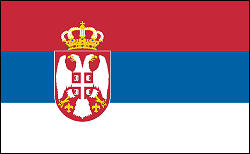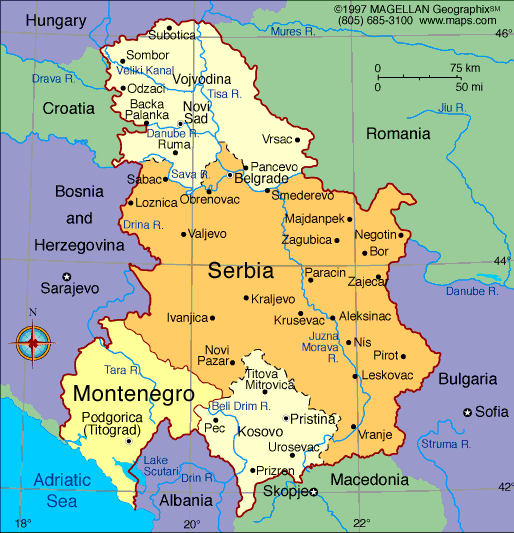SERBIA

Geography: Serbia is largely mountainous. Its northeast section is part of the rich, fertile Danubian Plain drained by the Danube, Tisa, Sava, and Morava river systems. It borders Croatia on the northwest, Hungary on the north, Romania on the northeast, Bulgaria on the east, Macedonia on the south, and Albania, Montenegro, and Bosnia and Herzegovina on the west.
Government: Republic. Serbia was one of six republics that made up the country of Yugoslavia, which broke up in the 1990s. In Feb. 2003, Serbia and Montenegro were the remaining two republics of rump Yugoslavia, forming a loose federation. In 2006, Montenegro split from Serbia.
History: Serbs settled the Balkan Peninsula in the 6th and 7th centuries and adopted Christianity in the 9th century. In 1166, Stefan Nemanja, a Serbian warrior and chief, founded the first Serbian state. By the 14th century, under the rule of Stefan Dusan, it became the most powerful state in the Balkans. After Serbia was defeated in the Battle of Kosovo in 1389, it was absorbed into the Ottoman Empire. Throughout the 19th century its struggle against Ottoman rule intensified, and in 1878 Serbia gained independence after Russia defeated the Ottoman Turks in the Russo-Turkish war of 1877–1878. In the Balkan wars (1912–1913), Serbia and other Balkan states seized hold of more former Ottoman lands on the peninsula.
World War I began when a Serbian nationalist assassinated Archduke Franz Ferdinand of Austria in 1914, which led to Austria's declaration of war against Serbia. Within months, much of Europe was at war. In the war's aftermath, Serbia became part of the Kingdom of the Serbs, Croats, and Slovenes (1918). It included the former kingdoms of Serbia and Montenegro; Bosnia-Herzegovina; Croatia-Slavonia, a semiautonomous region of Hungary; and Dalmatia. King Peter I of Serbia became the first monarch; his son, Alexander I, succeeded him on Aug. 16, 1921. Croatian demands for a federal state led Alexander to assume dictatorial powers in 1929 and to change the country's name to Yugoslavia. Serbian dominance continued despite his efforts, amid the resentment of other regions. A Macedonian associated with Croatian dissidents assassinated Alexander in Marseilles, France, on Oct. 9, 1934, and his cousin, Prince Paul, became regent for the king's son, Prince Peter.
Paul's pro-Axis policy brought Yugoslavia to sign the Axis Pact on March 25, 1941, and opponents overthrew the government two days later. On April 6 the Nazis occupied the country, and the young king and his government fled. Two guerrilla armies—the Chetniks under Draza Mihajlovic supporting the monarchy and the Partisans under Tito (Josip Broz) leaning toward the USSR—fought the Nazis for the duration of the war. In 1943, Tito established a provisional government, and in 1945 he won the federal election while monarchists boycotted the vote. The monarchy was abolished and the Communist Federal People's Republic of Yugoslavia, with Tito as prime minister, was born. Tito ruthlessly eliminated the opposition and broke with the Soviet bloc in 1948. Yugoslavia followed a middle road, combining orthodox Communist control of politics and general overall economic policy with a varying degree of freedom in the arts, travel, and individual enterprise. Tito became president in 1953 and president-for-life under a revised constitution adopted in 1963.

Map of Serbia
President: Tomislav Nikolic (2012)
Prime Minister: Aleksandar Vucic (2014)
Land and total area: 29,913 sq mi (77,474 sq
km)
Population (July 2014 est): 7,209,764
(growth rate: –0.46%); birth rate: 9.13/1000; infant mortality rate:
6.4/1000; life expectancy: 75.02.
Capital and largest city (2011 est.):
Belgrade, 1.135 million
Monetary unit: Yugoslav new dinar. In
Kosovo both the euro and the Yugoslav dinar are legal
National name: Republika Srbija
Languages:
Serbian (official) 88.1%, Hungarian 3.4%, Bosnian 1.9%,
Romany 1.4%, other 3.4%, undeclared or unknown 1.8%. Note: Serbian,
Hungarian, Slovak, Romanian, Croatian, and Rusyn all official in
Vojvodina (2011 est.)
Ethnicity/race:
Serb 83.3%, Hungarian 3.5%, Romany 2.1%, Bosniak 2%, other 5.7%, undeclared or unknown 3.4% (2011 est.)
Religions:
Serbian Orthodox 84.6%, Catholic 5%, Muslim
3.1%, Protestant 1%, atheist 1.1%, other 0.8%, undeclared or unknown
4.5% (2011 est.)
Literacy rate: 98% (2011 est.)
Economic summary: GDP/PPP
(2013 est.): $80.47 billion; per capita $11,100. Real growth
rate: 2%. Inflation: 2.2%. Unemployment: 20.1%.
Arable land: 37.28% Agriculture:
wheat, maize, sunflower, sugar beets, fruits (raspberries, apples, sour
cherries), vegetables (tomatoes, peppers, potatoes), beef, pork, and
meat products, milk and dairy products, grapes/wine. Labor force: 1.703 million; agriculture 23.9%, industry 16.5%, services 59.6% (2013). Industries: automobiles, base metals, furniture, food processing, machinery, chemicals, sugar, tires, clothes, pharmaceuticals. Natural
resources: oil, gas, coal, iron ore, copper, zinc,
antimony, chromite, gold, silver, magnesium, pyrite, limestone, marble,
salt, arable land. Exports: $14.61 billion
(2013 est.): iron and steel, rubber, clothes, wheat, fruit
and vegetables, nonferrous metals, electric appliances, metal products,
weapons and ammunition, automobiles.
Imports: $20.54 billion
(2013).
Communications: Telephones: main lines
in use: 2.977 million (2012); mobile cellular: 9.138 million (2012). Internet hosts: 1.102 million (2012) Internet users:
4.107 million (2009).
Transportation: Railways: total: 3,809
km (2010). Highways: total: 44,248 km; paved: 28,000 km,
unpaved: 16,248 km (2010). Waterways: 587 km; primarily on
Danube and Sava rivers (2009). Airports: 26 (2013).
International disputes:
Serbia with several other states protest the US and other states'
recognition of Kosovo's declaration of its status as a sovereign and
independent state in February 2008; ethnic Serbian municipalities along
Kosovo's northern border challenge final status of Kosovo-Serbia
boundary; several thousand NATO-led Kosovo Force peacekeepers under
United Nations Interim Administration Mission in Kosovo authority
continue to keep the peace within Kosovo between the ethnic Albanian
majority and the Serb minority in Kosovo; Serbia delimited about half of
the boundary with Bosnia and Herzegovina, but sections along the Drina
River remain in dispute.
-------------------- o --------------------
No comments:
Post a Comment